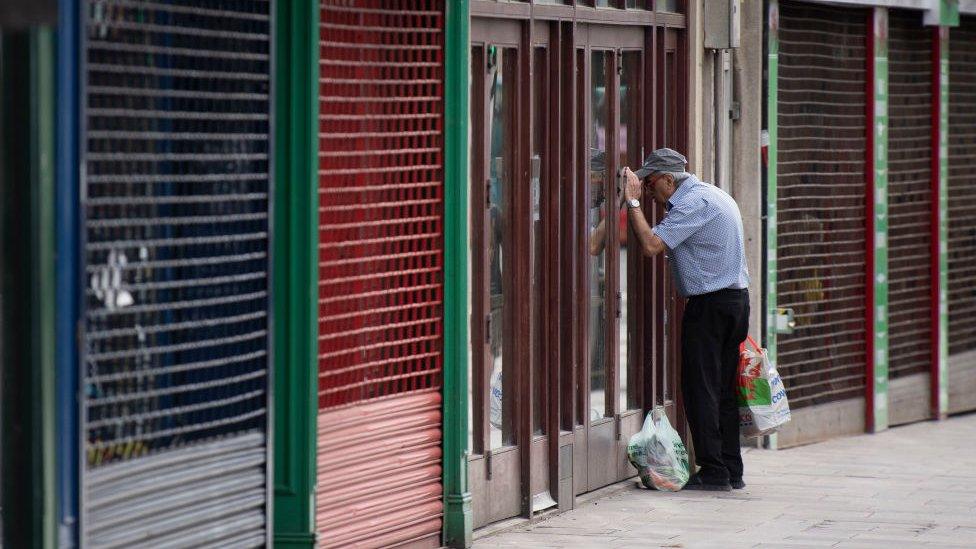Coronavirus in Scotland: Economic recovery plan announced
- Published

The economic advisory group was led by former banker Benny Higgins and looked at how businesses could be supported
Measures to help the economy recover from the Covid-19 crisis have been set out by the Scottish government.
Key policies include a £50m investment in a job guarantee for young people and a Transition Training Fund to support people being made redundant.
Planning rules are also to be revised and applications handled more swiftly.
Ministers said the measures would reduce obstacles to business investment.
Economy Secretary Fiona Hyslop set out the plans in response to recommendations from an advisory group led by former banker Benny Higgins.
What other measures are being introduced?
The government also intends to step up the support given by the "Pace" teams that help workers handle plant closures, with advice on training, their finances and job search.
A long-time complaint that smaller companies find it hard to secure government procurement contracts is being addressed, making greater use of digital technology.
The government is shifting the focus of Scottish Enterprise to concentrate more on regions. That includes £10m to start a project that will make better economic use of the River Clyde.

Analysis by BBC Scotland business and economy editor Douglas Fraser

Non-essential retailers were among the Scottish businesses hardest hit by lockdown
As with the outbreak of virus, trying to tackle the economic crisis is like the digital game of whack-a-mole. However hard you work to stamp out one problem, another pops up, and then another.
So it was inevitable that the economic recovery plan would be complex and wide-ranging. There's nothing simple about getting the economy back on track.
The group given the task of devising a plan, led by ex-Tesco Bank boss Benny Higgins, came up with 25 recommendations, not only going for growth, but making it inclusive and fair, directed at both growth and wellbeing.
If adopted, they could change the economic landscape significantly; government taking wide-ranging stakes in private companies, large and small; closer working between public and private sectors, with banks pushed to take a bigger responsibility for their customers' wellbeing: a much more regional focus to policy rather than defaulting to national scale; and seeing the economy as drawing together financial, social and physical wealth.
So the response from Fiona Hyslop was bound to be similarly wide-ranging and complex. It accepted the recommendations. But in turning them into action, it didn't have to be this turgid.
Instead of much sense of urgency, every proposal for tackling the deepest recession in perhaps 300 years is layered with a gloopy civil service policy syrup, combining defensive past commitments with often vague future plans.
Some of the most difficult items are kicked further down the road. Some recommendations are accepted, but on terms that risk them becoming bogged down in a task force, further reviews or a scoping exercise.
Setting out such a plan is an important moment for Scotland. These are the marching orders and battle plan, against a formidable recessionary foe. They've got at least some consensus. But as things stand, they won't inspire the troops, or put much fire in the belly.

There is to be a "cultural collective", commissioning freelance performers to work on new projects and help them through the shutdown of theatres. That is a change from the recommendation of a "National Arts Force".
Another former bank executive Sandy Begbie has been asked by Ms Hyslop to develop a plan for the job guarantee for young people, having had a similar role in setting up a scheme for City of Edinburgh Council. His recommendations are expected later this month.
Ms Hyslop commented: "We all acknowledge the scale of the challenge facing Scotland's economy as result of Covid-19, but we also recognise this is an opportunity to do things differently and crucially to rebuild a stronger, fairer and greener economic future.
"The Scottish government's focus will be on protecting jobs, creating jobs, ensuring quality jobs and supporting skilled jobs.
"We are working quickly to achieve this and many of the actions outlined today are already well under way".
'Swift action is needed'
Business groups have welcomed many of the measures, but said there must be swift action as well as policy development.
Andrew McRae, of the Federation of Small Businesses in Scotland, highlighted improvements to procurement from small firms, as well as digital skills and broadband infrastructure.
He said: "We need to see some detail about how policymakers will actually achieve these outcomes. These are thorny long-term problems that will take years to fix.

"The Scottish government needs to remember that businesses are quickly running out of road and their priority today is making it to tomorrow.
"Ministers need to apply resources to help firms through the next six months, and they should start with detailing how they will support smaller businesses subject to local lockdowns."
Environmental campaigners have complained the plans do not go far enough in helping make homes more energy efficient.
The Westminster plan for home improvement grants is not being applied in Scotland, though there are some funds already available.
Mary Church, of Friends of the Earth Scotland, said: "The Scottish government's blueprint for economic recovery is a woefully inadequate response to the scale of the challenges we face from Covid-19 and the climate emergency.
"The so-called 'green thread' running through the response is little more than rhetoric with very little in the way of concrete new commitments that would truly centre a just transition to a zero carbon economy".